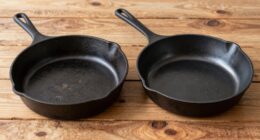To lose fat and weight effectively, you need to focus on sustainable habits and a balanced approach. Start by creating a caloric deficit; consume fewer calories than you burn. Adopt mindful eating, prioritize nutrient-dense foods like lean proteins and vegetables, and avoid processed snacks. Incorporate at least 150 minutes of aerobic exercise weekly alongside strength training to maintain your muscle mass. Building a support system can boost your motivation and accountability. Remember, it's about progress, not perfection, so celebrate each small win. There's much more to uncover about making lasting changes to your lifestyle.
Key Takeaways
- Focus on creating a caloric deficit by consuming fewer calories than you burn to promote sustainable fat loss.
- Prioritize nutrient-dense foods like lean proteins, whole grains, and vegetables to enhance fullness and reduce overall caloric intake.
- Incorporate regular exercise, aiming for at least 150 minutes of aerobic activity weekly and strength training twice a week to maintain muscle mass.
- Develop healthy habits gradually, such as mindful eating and meal prepping, to support consistent dietary choices and increase awareness.
- Build a support system by sharing your goals with friends or joining a community to enhance motivation and accountability throughout your journey.
Understanding Fat Loss vs. Weight Loss

When it comes to your health journey, understanding the difference between fat loss and weight loss is essential. Body weight measures total mass, which includes everything from water to muscle mass. However, focusing on body fat is more beneficial, as it provides a clearer picture of your health. You might weigh more yet feel healthier if you have higher muscle mass and lower body fat.
Successful fat loss prioritizes reducing body fat percentage instead of simply decreasing overall weight. Many people experience weight loss through water loss or muscle loss, which isn't true fat reduction.
To achieve sustainable fat loss, you need to maintain a caloric deficit, meaning you consume fewer calories than you burn. This balance of energy is critical for effective fat loss strategies.
Instead of seeking quick weight loss solutions, aim for fat loss that promotes a healthy weight. Rapid weight loss can lead to muscle loss and a decreased metabolic rate, ultimately harming your long-term health and body composition.
Effective Habit Formation Strategies

Forming effective habits is key to achieving sustainable fat loss. Start by adopting one new habit at a time, practicing it for two weeks to promote mastery. Daily consistency is essential; incorporate mindful eating, exercise at least three times a week, and make sure each meal includes vegetables and protein. Additionally, self-care practices can play a vital role in supporting your fat loss journey and emotional well-being. Remember that the emotional aspects of weight loss can be supported by seeking professional counseling, which helps address any underlying issues that may affect your motivation and progress. Engaging in activities that promote emotional well-being can also enhance your overall weight loss experience.
Keeping a food diary for three days can boost your awareness of eating habits, helping you make healthier choices and reduce overall food intake.
Small lifestyle changes can also greatly enhance your physical activity levels—opt for the stairs instead of the elevator or take short walks throughout the day.
Don't underestimate the power of support systems. Joining a group or seeking full-time coaching can provide the motivation and personalized assistance you need, fostering long-term adherence to these habit changes. Additionally, understanding your credit score can help you manage financial stress, which often impacts weight loss efforts.
Importance of Nutrition Quality

Building effective habits sets the foundation for long-term fat loss, but the quality of what you eat plays a significant role in your success. Focusing on nutrition quality can lead to better outcomes. Here's why it matters:
- High-quality, nutrient-dense foods like lean proteins, whole grains, and vegetables help provide essential vitamins and minerals. Incorporating keto recipes can also support a low-carb, high-fat diet that promotes fat loss. Additionally, including chia seeds in your diet can enhance your nutrient intake and provide healthy omega-3 fatty acids. Foods with high-quality protein sources are beneficial for maintaining muscle mass during weight loss. Including meal replacement juices can also assist in reducing calorie intake while providing essential nutrients.
- Eating healthy foods promotes satiety, making you feel fuller for longer and reducing overall caloric intake.
- Replacing calorie-dense, processed foods with calorie-dilute options like fruits and vegetables can ease calorie reduction without sacrificing nutrition.
A balanced intake of macronutrients—proteins, fats, and carbohydrates—is essential for metabolic efficiency and energy regulation. This balance supports effective fat loss while ensuring you feel satisfied. Additionally, adopting a diet rich in raw foods can enhance nutrient retention and overall health benefits.
Research shows that opting for whole foods instead of processed options leads to greater feelings of fullness. Remember to limit added sugars, as the American Heart Association advises, to avoid unnecessary weight gain.
Increasing Physical Activity Levels

Boosting your physical activity levels is essential for effective fat loss and overall health. Engaging in regular physical activity, like aerobic exercise for at least 150 minutes each week, helps support your weight-loss efforts. Incorporating low carb high protein breakfasts can provide the necessary energy and nutrients for your workouts.
Don't forget to incorporate strength training exercises at least twice a week to maintain muscle mass, which is vital for a healthy metabolism. Simple lifestyle changes can greatly increase your daily calorie burn. Opt for the stairs instead of the elevator, or take short walks during your breaks. Movement plays a key role in Non-Exercise Activity Thermogenesis (NEAT), which can account for a substantial portion of your daily calorie expenditure. Additionally, regular physical activity enhances cardiovascular health, supporting overall well-being. Engaging in physical activities can also help reduce the risk of ear pressure during colds, which can be exacerbated by inactivity. Moreover, maintaining an active lifestyle can be supported by energy-efficient technology that helps create comfortable environments for exercise.
Furthermore, consider adding cardio intervals to your routine. These involve short bursts of high-intensity exercise followed by recovery periods, enhancing calorie burn and improving cardiovascular fitness. Eating a nutritious breakfast can also set a positive tone for the day and support your energy levels.
By increasing your physical activity levels, you'll not only boost your calorie expenditure but also foster a more active lifestyle that supports your weight-loss goals. Furthermore, maintaining an organized and clutter-free environment can enhance your motivation to stay active, as it promotes mental clarity and reduces distractions that may hinder your exercise routine.
Building a Support System for Success

A strong support system can make a significant difference in your fat loss journey. Surrounding yourself with the right people boosts your motivation and accountability, making it easier to reach your fat loss goals.
Here are three key elements to take into account when building your support system:
- Engage in a structured program: Look for programs that offer personalized assistance and full-time coaching. This guidance can help you navigate your fat loss journey more effectively.
- Create a sense of community: Share your progress and challenges with friends, family, or support groups. This connection fosters commitment and helps you stay focused.
- Utilize social media or fitness apps: Connecting with others on similar paths can provide additional motivation and encouragement through shared experiences.
Regular check-ins with a coach or support group can help you tackle setbacks and reinforce positive behaviors.
By cultivating a strong support system, you'll not only enhance your chances of long-term success but also create a network that celebrates your progress along the way.
Frequently Asked Questions
What Is the 30/30/30 Rule for Fat Loss?
The 30/30/30 rule for fat loss recommends you split your daily caloric intake into three equal parts: 30% protein, 30% healthy fats, and 30% carbohydrates.
This balanced approach helps you maintain steady energy levels and supports muscle preservation while you lose fat.
What Is the Easiest Way to Lose Weight and Fat?
The easiest way to lose weight and fat is to create a caloric deficit. Aim to consume 500 to 750 fewer calories than you burn daily.
Incorporate mindful eating—slow down and stop when you're about 80% full. Regular physical activity is essential too; try to get at least 150 minutes of moderate exercise weekly.
Finally, swap out calorie-dense foods for nutrient-rich options to keep you satisfied while cutting calories.
What Is the 3/2:1 Rule for Weight Loss?
The 3/2:1 rule for weight loss is a simple guideline that helps you balance your meals.
It suggests you consume three servings of vegetables, two servings of fruit, and one serving of protein at each meal.
By following this rule, you'll prioritize nutrient-dense foods, feel fuller, and reduce the temptation to snack on unhealthy options.
It's an effective way to improve your eating habits while supporting your overall health and weight management goals.
What Is the 80/20 Rule for Fat Loss?
Imagine you're planting a garden. You'll find that 20% of your efforts—like choosing the right seeds and watering—yield 80% of your blooms.
The 80/20 rule for fat loss works similarly. Focus on healthy eating and regular exercise for the majority of your results, while allowing yourself to enjoy treats 20% of the time.
This balanced approach keeps you motivated and satisfied, making it easier to stick to your goals without feeling deprived.
Conclusion
Just like a sculptor chisels away at marble to reveal a masterpiece, you too can shape your body and health with dedication and the right tools. By understanding the difference between fat loss and weight loss, forming positive habits, prioritizing nutrition, boosting activity, and leaning on a supportive community, you'll uncover your best self. Embrace the journey, and remember: every small strike of the chisel brings you closer to the sculpture you're meant to be.









